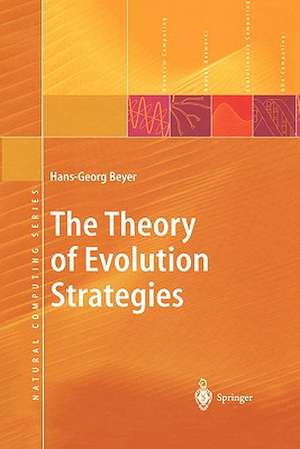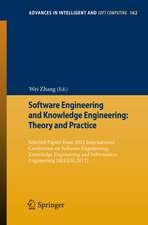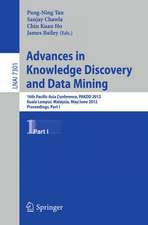The Theory of Evolution Strategies: Natural Computing Series
Autor Hans-Georg Beyeren Limba Engleză Paperback – 6 dec 2010
This monograph provides the framework and the first steps toward the theoretical analysis of Evolution Strategies (ES). The main emphasis is on understanding the functioning of these probabilistic optimization algorithms in real-valued search spaces by investigating the dynamical properties of some well-established ES algorithms. The book introduces the basic concepts of this analysis, such as progress rate, quality gain, and self-adaptation response, and describes how to calculate these quantities. Based on the analysis, functioning principles are derived, aiming at a qualitative understanding of why and how ES algorithms work.
| Toate formatele și edițiile | Preț | Express |
|---|---|---|
| Paperback (1) | 992.26 lei 6-8 săpt. | |
| Springer Berlin, Heidelberg – 6 dec 2010 | 992.26 lei 6-8 săpt. | |
| Hardback (1) | 997.56 lei 6-8 săpt. | |
| Springer Berlin, Heidelberg – 27 mar 2001 | 997.56 lei 6-8 săpt. |
Din seria Natural Computing Series
- 20%
 Preț: 507.38 lei
Preț: 507.38 lei - 20%
 Preț: 305.91 lei
Preț: 305.91 lei - 20%
 Preț: 617.14 lei
Preț: 617.14 lei - 20%
 Preț: 645.47 lei
Preț: 645.47 lei - 20%
 Preț: 642.65 lei
Preț: 642.65 lei - 20%
 Preț: 998.04 lei
Preț: 998.04 lei - 18%
 Preț: 963.60 lei
Preț: 963.60 lei - 20%
 Preț: 655.20 lei
Preț: 655.20 lei - 20%
 Preț: 615.70 lei
Preț: 615.70 lei - 20%
 Preț: 645.65 lei
Preț: 645.65 lei - 20%
 Preț: 640.19 lei
Preț: 640.19 lei - 20%
 Preț: 655.02 lei
Preț: 655.02 lei -
 Preț: 384.70 lei
Preț: 384.70 lei - 20%
 Preț: 652.54 lei
Preț: 652.54 lei - 20%
 Preț: 649.28 lei
Preț: 649.28 lei - 20%
 Preț: 330.75 lei
Preț: 330.75 lei - 20%
 Preț: 328.09 lei
Preț: 328.09 lei -
 Preț: 389.70 lei
Preț: 389.70 lei - 20%
 Preț: 644.66 lei
Preț: 644.66 lei - 20%
 Preț: 333.88 lei
Preț: 333.88 lei - 20%
 Preț: 1299.31 lei
Preț: 1299.31 lei - 20%
 Preț: 528.47 lei
Preț: 528.47 lei - 20%
 Preț: 648.11 lei
Preț: 648.11 lei - 15%
 Preț: 639.90 lei
Preț: 639.90 lei - 20%
 Preț: 322.43 lei
Preț: 322.43 lei - 20%
 Preț: 657.83 lei
Preț: 657.83 lei - 20%
 Preț: 659.31 lei
Preț: 659.31 lei - 20%
 Preț: 997.56 lei
Preț: 997.56 lei - 20%
 Preț: 508.61 lei
Preț: 508.61 lei -
 Preț: 400.85 lei
Preț: 400.85 lei - 20%
 Preț: 653.38 lei
Preț: 653.38 lei - 20%
 Preț: 308.60 lei
Preț: 308.60 lei - 20%
 Preț: 654.05 lei
Preț: 654.05 lei - 15%
 Preț: 652.17 lei
Preț: 652.17 lei - 20%
 Preț: 336.54 lei
Preț: 336.54 lei - 20%
 Preț: 656.19 lei
Preț: 656.19 lei
Preț: 992.26 lei
Preț vechi: 1240.32 lei
-20% Nou
Puncte Express: 1488
Preț estimativ în valută:
189.89€ • 206.19$ • 159.51£
189.89€ • 206.19$ • 159.51£
Carte tipărită la comandă
Livrare economică 22 aprilie-06 mai
Preluare comenzi: 021 569.72.76
Specificații
ISBN-13: 9783642086700
ISBN-10: 3642086705
Pagini: 404
Ilustrații: XX, 381 p.
Dimensiuni: 155 x 235 x 21 mm
Greutate: 0.56 kg
Ediția:Softcover reprint of hardcover 1st ed. 2001
Editura: Springer Berlin, Heidelberg
Colecția Springer
Seria Natural Computing Series
Locul publicării:Berlin, Heidelberg, Germany
ISBN-10: 3642086705
Pagini: 404
Ilustrații: XX, 381 p.
Dimensiuni: 155 x 235 x 21 mm
Greutate: 0.56 kg
Ediția:Softcover reprint of hardcover 1st ed. 2001
Editura: Springer Berlin, Heidelberg
Colecția Springer
Seria Natural Computing Series
Locul publicării:Berlin, Heidelberg, Germany
Public țintă
ResearchCuprins
1. Introduction.- 2. Concepts for the Analysis of the ES.- 3. The Progress Rate of the (1 % MathType!MTEF!2!1!+-% feaagCart1ev2aaatCvAUfeBSjuyZL2yd9gzLbvyNv2CaerbuLwBLn% hiov2DGi1BTfMBaeXatLxBI9gBaerbd9wDYLwzYbItLDharqqtubsr% 4rNCHbGeaGqiVu0Je9sqqrpepC0xbbL8F4rqqrFfpeea0xe9Lq-Jc9% vqaqpepm0xbba9pwe9Q8fs0-yqaqpepae9pg0FirpepeKkFr0xfr-x% fr-xb9adbaqaaeGaciGaaiaabeqaamaabaabaaGcbaaeaaaaaaaaa8% qadaqadaWdaeaapeGaaGyma8aadaWfGaqaa8qacaGGSaaal8aabeqa% a8qacqGHRaWkaaGccqaH7oaBaiaawIcacaGLPaaaaaa!3C4E!$$\left( {1\mathop ,\limits^ + \lambda } \right)$$ ?)-ES on the Sphere Model.- 5. The Analysis of the (?, ?)-ES.- 6. The (?/?, ?) Strategies — or Why “Sex” May be Good.- 7. The (1, ?)-?-Self-Adaptation.- Appendices.- A. Integrals.- A.1 Definite Integrals of the Normal Distribution.- A.2 Indefinite Integrals of the Normal Distribution.- A.3 Some Integral Identities.- B. Approximations.- B.1 Frequently Used Taylor Expansions.- B.3 Cumulants, Moments, and Approximations.- B.3.1 Fundamental Relations.- B.3.2 The Weight Coefficients for the Density Approximation of a Standardized Random Variable.- B.4 Approximation of the Quantile Function.- C. The Normal Distribution.- C.3 Product Moments of Correlated Gaussian Mutations.- C.3.1 Fundamental Relations.- C.3.2 Derivation of the Product Moments.- D. (1, ?)-Progress Coefficients.- D.2 Table of Progress Coefficients of the (1, ?)-ES.- References.
Recenzii
From the reviews:
"He gives an extensive mathematical treatment of idealised models of behaviour for several types of EA … . The detail is extensive enough to guide and educate graduate students … . The figures are clear and convincing. Part of the quality of the book is its aesthetically pleasing layout, for both figures and mathematics. … The book is a desirable resource for all those, students and others, who need or wish to have a single portable source for the mathematically-based fundamentals of the subject." (John Campbell, Expert Update, Vol. 6 (1), 2003)
"Evolutionary algorithms (EA) have found a broad acceptance as robust optimization algorithms in the last ten years. … The aim of this monograph is to provide a theoretical framework for the ES research field. … The book contains references to open problems, to new problem formulations, and to future research directions at the relevant places." (Horst Hollatz, Zentralblatt MATH, Vol. 969, 2001)
"He gives an extensive mathematical treatment of idealised models of behaviour for several types of EA … . The detail is extensive enough to guide and educate graduate students … . The figures are clear and convincing. Part of the quality of the book is its aesthetically pleasing layout, for both figures and mathematics. … The book is a desirable resource for all those, students and others, who need or wish to have a single portable source for the mathematically-based fundamentals of the subject." (John Campbell, Expert Update, Vol. 6 (1), 2003)
"Evolutionary algorithms (EA) have found a broad acceptance as robust optimization algorithms in the last ten years. … The aim of this monograph is to provide a theoretical framework for the ES research field. … The book contains references to open problems, to new problem formulations, and to future research directions at the relevant places." (Horst Hollatz, Zentralblatt MATH, Vol. 969, 2001)
Textul de pe ultima copertă
Evolutionary Algorithms, in particular Evolution Strategies, Genetic Algorithms, or Evolutionary Programming, have found wide acceptance as robust optimization algorithms in the last ten years. Compared with the broad propagation and the resulting practical prosperity in different scientific fields, the theory has not progressed as much.
This monograph provides the framework and the first steps toward the theoretical analysis of Evolution Strategies (ES). The main emphasis is on understanding the functioning of these probabilistic optimization algorithms in real-valued search spaces by investigating the dynamical properties of some well-established ES algorithms. The book introduces the basic concepts of this analysis, such as progress rate, quality gain, and self-adaptation response, and describes how to calculate these quantities. Based on the analysis, functioning principles are derived, aiming at a qualitative understanding of why and how ES algorithms work.
This monograph provides the framework and the first steps toward the theoretical analysis of Evolution Strategies (ES). The main emphasis is on understanding the functioning of these probabilistic optimization algorithms in real-valued search spaces by investigating the dynamical properties of some well-established ES algorithms. The book introduces the basic concepts of this analysis, such as progress rate, quality gain, and self-adaptation response, and describes how to calculate these quantities. Based on the analysis, functioning principles are derived, aiming at a qualitative understanding of why and how ES algorithms work.
Caracteristici
Provides the theoretical framework for Evolution Strategies Includes supplementary material: sn.pub/extras





















